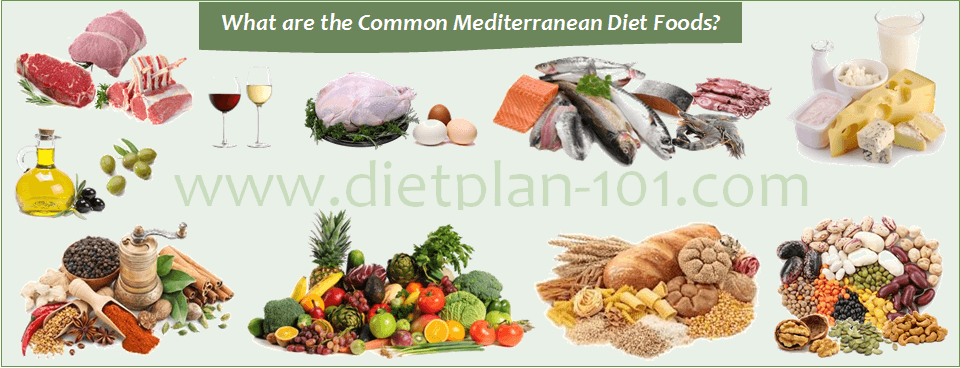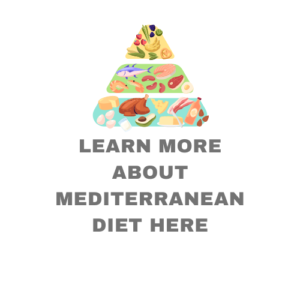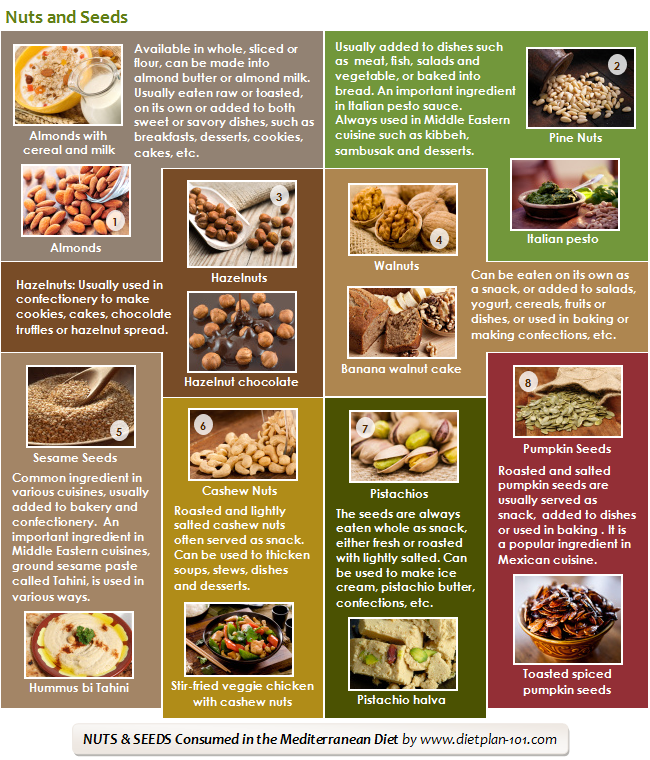
Mediterranean Diet Food List
The common Mediterranean foods that are in the Mediterranean diet pyramid are vegetables, fruits, whole grains, legumes, olive oil, herb and spices, dairy products, seafood, poultry (including eggs), red meat, as well as wine. These foods are consumed in different amounts.
[ads]

- Emphasize Plant Foods
The Mediterranean diet emphasizes on high consumption of plant foods. Vegetables are usually eaten fresh while fresh fruits are always served as dessert. Whole grains are high in fibre and have very few trans fats. Wholemeal pasta and whole meal bread are great choices. Legumes include peas, beans, lentils and nuts which are rich in protein and fibre. Nuts and seeds are good for health as they are high in monounsaturated and polyunsaturated fats that help in maintaining healthy blood vessels. However, since they are high in fats and calories, it is not advisable to consume too much. The best choice is unsalted or unflavored nuts. Herbs and spices are used for adding flavours to food. - Focus on Type of Fat Consumed
The main focus of the Mediterranean diet is not on the total fat consumed, but instead on what type of fat is eaten. Unhealthy saturated fats as well as hydrogenated oils that contain trans fats are always avoided. These fats are usually the main culprit of heart disease. The primary source of fat in the Mediterranean diet is healthy olive oil. Olive oil is high in monounsaturated fats, such as oleic acid, that may reduce the risk of coronary heart disease. Studies show these monounsaturated fats help prevent bad LDL cholesterol from converting into its most damaging form. Olive oil is usually used for tossing salads or as a dip for bread. - Dairy in Moderate Amount
Dairy products, especially cheeses and yoghurts, are consumed in moderate amounts in the Mediterranean diet. However, since dairy products have lots of saturated fat, a lower fat type is preferred. - Seafood is Preferred to Poultry and Meat
Seafood, especially oily fish, is a preferred source of protein to poultry and red meat. Fish such as mackerel, salmon, lake trout, herring, sardines, and albacore tuna are great sources of omega-3 fatty acids. Fish is consumed in moderate to high amounts while poultry in moderate amounts. For eggs, the maximum quantity allowed per week is seven. Red meat and meat products are consumed less frequent. - Wine during Meal Times
Wine, especially red wine (white wine or beer are alternatives), also plays an important role in this diet. It is consumed in a moderate amount during meal times. Some studies reveal that a moderate amount of alcohol in a daily diet will reduce the risk of heart disease. For women or men over age 65, the daily amount should not be more than 5 ounces while for men under age 65, it should not be more than 10 ounces. However, if a person has a family history of alcohol abuse, or heart or liver disease, he or she should avoid consuming any wine or alcohol.
[ads]
Common Types of Vegetables and Fruit in the Mediterranean Diet
The Mediterranean diet emphasizes consuming a lot of vegetables and fruits. Among these are leafy vegetables which are usually eaten as a salad, such as arugulas and lettuces, bulb vegetables such as leeks and onion, stalk vegetables such as celery and fennel bulbs and fruit vegetables such as bell peppers and squash. Besides, root vegetables such as beets and carrots, tuber vegetables such as potatoes and inflorescent vegetables such as artichokes and broccoli are also among the common vegetables eaten.
The common fruits consumed in this diet are citrus fruits such as grapefruits (related: grapefruit diet) and tangerines, melons such as cantaloupe and honeydew, as well as tomatoes, olives, etc.

[ads]

Legumes, Nuts and Seeds on Grocery List
The Mediterranean diet encourages the inclusion of 2 to 4 cups of cooked legumes into the diet weekly. Legumes such as peas, beans and lentils are great sources of vegetable protein and fibre.
Besides that, various nuts and seeds which are rich in monounsaturated and polyunsaturated fats are also consumed regularly but in small quantities for each serving.
Legumes Consumed in the Mediterranean Diet

Nuts and Seeds Consumed in the Mediterranean Diet

Next Page: Whole Grains, Herbs and Spices, Dairy Products and Seafood in the Mediterranean Diet


